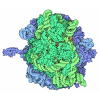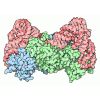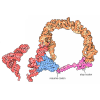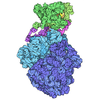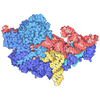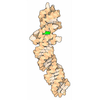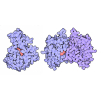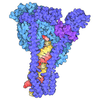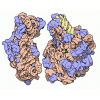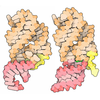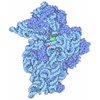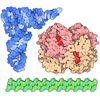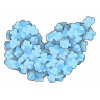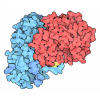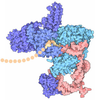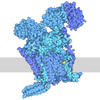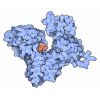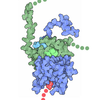+ Open data
Open data
- Basic information
Basic information
| Entry | Database: PDB / ID: 9gcm | ||||||
|---|---|---|---|---|---|---|---|
| Title | Structure of the U11 snRNP core | ||||||
 Components Components |
| ||||||
 Keywords Keywords | SPLICING / minor spliceosome / U11 snRNP / RNA-protein complex | ||||||
| Function / homology |  Function and homology information Function and homology informationsnRNA binding / U12-type spliceosomal complex / mRNA Splicing - Minor Pathway / intercellular bridge / RNA splicing / response to glucocorticoid / mRNA splicing, via spliceosome / mRNA binding / apoptotic process / nucleolus ...snRNA binding / U12-type spliceosomal complex / mRNA Splicing - Minor Pathway / intercellular bridge / RNA splicing / response to glucocorticoid / mRNA splicing, via spliceosome / mRNA binding / apoptotic process / nucleolus / nucleoplasm / nucleus / cytosol Similarity search - Function | ||||||
| Biological species |  Homo sapiens (human) Homo sapiens (human) | ||||||
| Method | ELECTRON MICROSCOPY / single particle reconstruction / cryo EM / Resolution: 3.1 Å | ||||||
 Authors Authors | Zhao, J. / Galej, W.P. | ||||||
| Funding support | European Union, 1items
| ||||||
 Citation Citation |  Journal: Mol Cell / Year: 2025 Journal: Mol Cell / Year: 2025Title: Structural basis of 5' splice site recognition by the minor spliceosome. Authors: Jiangfeng Zhao / Daniel Peter / Irina Brandina / Xiangyang Liu / Wojciech P Galej /  Abstract: The minor spliceosome catalyzes excision of U12-dependent introns from precursors of eukaryotic messenger RNAs (pre-mRNAs). This process is critical for many cellular functions, but the underlying ...The minor spliceosome catalyzes excision of U12-dependent introns from precursors of eukaryotic messenger RNAs (pre-mRNAs). This process is critical for many cellular functions, but the underlying molecular mechanisms remain elusive. Here, we report a cryoelectron microscopy (cryo-EM) reconstruction of the 13-subunit human U11 small nuclear ribonucleoprotein particle (snRNP) complex in apo and substrate-bound forms, revealing the architecture of the U11 small nuclear RNA (snRNA), five minor spliceosome-specific factors, and the mechanism of the U12-type 5' splice site (5'SS) recognition. SNRNP25 and SNRNP35 specifically recognize U11 snRNA, while PDCD7 bridges SNRNP25 and SNRNP48, located at the distal ends of the particle. SNRNP48 and ZMAT5 are positioned near the 5' end of U11 snRNA and stabilize binding of the incoming 5'SS. Recognition of the U12-type 5'SS is achieved through base-pairing to the 5' end of the U11 snRNA and unexpected, non-canonical base-triple interactions with the U11 snRNA stem-loop 3. Our structures provide mechanistic insights into U12-dependent intron recognition and the evolution of the splicing machinery. | ||||||
| History |
|
- Structure visualization
Structure visualization
| Structure viewer | Molecule:  Molmil Molmil Jmol/JSmol Jmol/JSmol |
|---|
- Downloads & links
Downloads & links
- Download
Download
| PDBx/mmCIF format |  9gcm.cif.gz 9gcm.cif.gz | 137.1 KB | Display |  PDBx/mmCIF format PDBx/mmCIF format |
|---|---|---|---|---|
| PDB format |  pdb9gcm.ent.gz pdb9gcm.ent.gz | 95.8 KB | Display |  PDB format PDB format |
| PDBx/mmJSON format |  9gcm.json.gz 9gcm.json.gz | Tree view |  PDBx/mmJSON format PDBx/mmJSON format | |
| Others |  Other downloads Other downloads |
-Validation report
| Summary document |  9gcm_validation.pdf.gz 9gcm_validation.pdf.gz | 1.4 MB | Display |  wwPDB validaton report wwPDB validaton report |
|---|---|---|---|---|
| Full document |  9gcm_full_validation.pdf.gz 9gcm_full_validation.pdf.gz | 1.4 MB | Display | |
| Data in XML |  9gcm_validation.xml.gz 9gcm_validation.xml.gz | 31.1 KB | Display | |
| Data in CIF |  9gcm_validation.cif.gz 9gcm_validation.cif.gz | 42 KB | Display | |
| Arichive directory |  https://data.pdbj.org/pub/pdb/validation_reports/gc/9gcm https://data.pdbj.org/pub/pdb/validation_reports/gc/9gcm ftp://data.pdbj.org/pub/pdb/validation_reports/gc/9gcm ftp://data.pdbj.org/pub/pdb/validation_reports/gc/9gcm | HTTPS FTP |
-Related structure data
| Related structure data |  51234MC  8r7nC  9gbwC  9gbzC  9gc0C  9gclC M: map data used to model this data C: citing same article ( |
|---|---|
| Similar structure data | Similarity search - Function & homology  F&H Search F&H Search |
- Links
Links
- Assembly
Assembly
| Deposited unit | 
|
|---|---|
| 1 |
|
- Components
Components
| #1: RNA chain | Mass: 43505.629 Da / Num. of mol.: 1 Source method: isolated from a genetically manipulated source Source: (gene. exp.)  Homo sapiens (human) / Production host: Homo sapiens (human) / Production host:  Homo sapiens (human) / References: GenBank: 161169046 Homo sapiens (human) / References: GenBank: 161169046 |
|---|---|
| #2: Protein | Mass: 15290.729 Da / Num. of mol.: 1 Source method: isolated from a genetically manipulated source Source: (gene. exp.)  Homo sapiens (human) / Gene: SNRNP25, C16orf33 / Production host: Homo sapiens (human) / Gene: SNRNP25, C16orf33 / Production host:  Homo sapiens (human) / References: UniProt: Q9BV90 Homo sapiens (human) / References: UniProt: Q9BV90 |
| #3: Protein | Mass: 29514.471 Da / Num. of mol.: 1 Source method: isolated from a genetically manipulated source Source: (gene. exp.)  Homo sapiens (human) / Gene: SNRNP35, HM1, U1SNRNPBP / Production host: Homo sapiens (human) / Gene: SNRNP35, HM1, U1SNRNPBP / Production host:  Homo sapiens (human) / References: UniProt: Q16560 Homo sapiens (human) / References: UniProt: Q16560 |
| #4: Protein | Mass: 54791.984 Da / Num. of mol.: 1 Source method: isolated from a genetically manipulated source Source: (gene. exp.)  Homo sapiens (human) / Gene: PDCD7 / Production host: Homo sapiens (human) / Gene: PDCD7 / Production host:  Homo sapiens (human) / References: UniProt: Q8N8D1 Homo sapiens (human) / References: UniProt: Q8N8D1 |
| Has protein modification | N |
-Experimental details
-Experiment
| Experiment | Method: ELECTRON MICROSCOPY |
|---|---|
| EM experiment | Aggregation state: PARTICLE / 3D reconstruction method: single particle reconstruction |
- Sample preparation
Sample preparation
| Component | Name: Structure of the U11 snRNP core / Type: COMPLEX / Entity ID: all / Source: NATURAL | |||||||||||||||
|---|---|---|---|---|---|---|---|---|---|---|---|---|---|---|---|---|
| Molecular weight | Value: 0.13 MDa / Experimental value: NO | |||||||||||||||
| Source (natural) | Organism:  Homo sapiens (human) Homo sapiens (human) | |||||||||||||||
| Buffer solution | pH: 7.9 / Details: 20 mM HEPES-KOH, pH 7.9 200 mM KCl 2 mM MgCl2 | |||||||||||||||
| Buffer component |
| |||||||||||||||
| Specimen | Conc.: 0.2 mg/ml / Embedding applied: NO / Shadowing applied: NO / Staining applied: NO / Vitrification applied: YES / Details: This sample was monodisperse | |||||||||||||||
| Specimen support | Grid type: UltrAuFoil R2/2 | |||||||||||||||
| Vitrification | Instrument: FEI VITROBOT MARK IV / Cryogen name: ETHANE / Humidity: 95 % / Chamber temperature: 277.15 K |
- Electron microscopy imaging
Electron microscopy imaging
| Experimental equipment |  Model: Titan Krios / Image courtesy: FEI Company |
|---|---|
| Microscopy | Model: FEI TITAN KRIOS Details: Preliminary grid screening was performed on Glacios. |
| Electron gun | Electron source:  FIELD EMISSION GUN / Accelerating voltage: 300 kV / Illumination mode: FLOOD BEAM FIELD EMISSION GUN / Accelerating voltage: 300 kV / Illumination mode: FLOOD BEAM |
| Electron lens | Mode: BRIGHT FIELD / Nominal magnification: 165000 X / Nominal defocus max: 1700 nm / Nominal defocus min: 700 nm / Cs: 2.7 mm / C2 aperture diameter: 50 µm / Alignment procedure: ZEMLIN TABLEAU |
| Specimen holder | Cryogen: NITROGEN / Specimen holder model: FEI TITAN KRIOS AUTOGRID HOLDER |
| Image recording | Electron dose: 41.73 e/Å2 / Film or detector model: FEI FALCON IV (4k x 4k) / Num. of grids imaged: 2 / Num. of real images: 30164 / Details: Images were colleted in EER format |
| EM imaging optics | Energyfilter name: TFS Selectris X / Energyfilter slit width: 10 eV |
| Image scans | Width: 4096 / Height: 4096 |
- Processing
Processing
| EM software |
| ||||||||||||||||||||||||||||||||||||
|---|---|---|---|---|---|---|---|---|---|---|---|---|---|---|---|---|---|---|---|---|---|---|---|---|---|---|---|---|---|---|---|---|---|---|---|---|---|
| CTF correction | Type: NONE | ||||||||||||||||||||||||||||||||||||
| Particle selection | Num. of particles selected: 7144222 / Details: Topaz picking is performed with user-trained model | ||||||||||||||||||||||||||||||||||||
| 3D reconstruction | Resolution: 3.1 Å / Resolution method: FSC 0.143 CUT-OFF / Num. of particles: 268233 / Symmetry type: POINT | ||||||||||||||||||||||||||||||||||||
| Atomic model building | B value: 71.2 / Protocol: RIGID BODY FIT / Space: REAL / Target criteria: Cross-correction coefficient / Details: refinement is done in Phenix | ||||||||||||||||||||||||||||||||||||
| Atomic model building | 3D fitting-ID: 1 / Source name: AlphaFold / Type: in silico model
|
 Movie
Movie Controller
Controller








 PDBj
PDBj